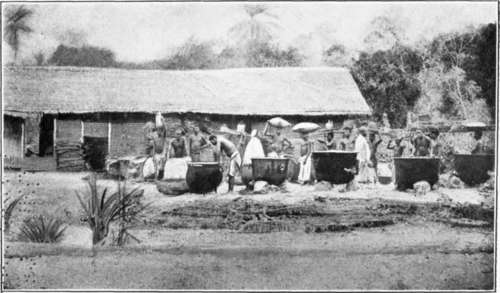History of Production and Processing of Edible Oil in Nigeria
Industry news / Chat on line / Give me a price / Date: February 20, 2016
Oil palm and ground nut oil are the first generation of vegetable oil to be produced and processed at commercial scale in Nigeria. Ground nut oil is produced from leguminous plant in the Northern part of the country and oil palm is grown in the southern part of the country.
 There has been extensive development of ground nut and oil palm industries in many countries in the tropics. This is because of the extremely high potential productivity of the crops. The oil palm gives the highest yield of oil per unit area compared to any other crop and produces two distinct oils – palm oil and palm kernel oil. These two products are important in world trade. Modern high-yielding varieties of oil palm were developed by breeding programs, under ideal climatic conditions and good management. The plants are capable of producing in excess of 20 tonnes of bunches/ha/yr, with palm oil in bunch content of 25 percent. This is equivalent to a yield of 5 tonnes oil/ha/yr (excluding the palm kernel oil), which far outstrips any other source of edible oil. The export of palm kernels began in 1832 and by 1911 British West Africa alone exported 157000 tonnes of which about 75 percent came from Nigeria. Nigeria was the largest exporter until 1934 when the country was surpassed by Malaysia.
There has been extensive development of ground nut and oil palm industries in many countries in the tropics. This is because of the extremely high potential productivity of the crops. The oil palm gives the highest yield of oil per unit area compared to any other crop and produces two distinct oils – palm oil and palm kernel oil. These two products are important in world trade. Modern high-yielding varieties of oil palm were developed by breeding programs, under ideal climatic conditions and good management. The plants are capable of producing in excess of 20 tonnes of bunches/ha/yr, with palm oil in bunch content of 25 percent. This is equivalent to a yield of 5 tonnes oil/ha/yr (excluding the palm kernel oil), which far outstrips any other source of edible oil. The export of palm kernels began in 1832 and by 1911 British West Africa alone exported 157000 tonnes of which about 75 percent came from Nigeria. Nigeria was the largest exporter until 1934 when the country was surpassed by Malaysia.
Africa led the world in production and export of palm oil throughout the first half of the 20th century, led by Nigeria and Zaire. By 1966, however, Malaysia and Indonesia had surpassed Africa's total palm oil production.
According to Oil Palm Review, published by the Tropical Development and Research Institute in the United Kingdom, over 3 million tonnes of palm oil was produced by Malaysia alone in 1983, compared with a total of about 1.3 million tonnes of African production. The production of this important dietary component is still at declining trend in Nigeria despite the effort institutes to conduct research and give appropriate advice to government in formulation of policy guide on the production, propagation and processing of the crop.

Africa led the world in production and export of palm oil throughout the first half of the 20th century, led by Nigeria and Zaire. By 1966, however, Malaysia and Indonesia had surpassed Africa's total palm oil production.
According to Oil Palm Review, published by the Tropical Development and Research Institute in the United Kingdom, over 3 million tonnes of palm oil was produced by Malaysia alone in 1983, compared with a total of about 1.3 million tonnes of African production. The production of this important dietary component is still at declining trend in Nigeria despite the effort institutes to conduct research and give appropriate advice to government in formulation of policy guide on the production, propagation and processing of the crop.
contact us
- QDo you want to buy machine?
- Yes, I want to buy machine.
- No, I want to learn more in advance.
- QWhat oil seeds do you want to process?
- Palm fruit
- Palm kernel/nut
- Peanut/Groundnut
- Soybean/Soya bean
- Sunflower seed
- Cottonseed
- Rapeseed/Canola
- Dried coconut
- Rice bran
- Corn germ
- More than two oilseeds:
- Other:
- QHow many tons palm fruit bunches will you process per day?
- 1-10 tons per day
- 10-30 tons per day
- 30-50 tons per day
- 50-100 tons per day
- QWhat machine do you want?
- Palm oil presser
- Other single machine (thresher, clarification tank, vibrating screen, filter...)
- Palm oil pressing line (from FFB to crude oil)
- Palm oil refining line (to produce refined, bleached, deodorized oil)
- Palm oil bottling / filling line
- QWhat machine do you want?
- Palm oil pressing line (from FFB to crude oil)
- Palm oil refining line (to produce refined, bleached, deodorized oil)
- Palm oil bottling / filling line
- QHow many tons oil seeds will you process per day?
- 1-20 tons per day
- 20-50 tons per day
- 50-100 tons per day
- QWhat machine do you want?
- Oil presser
- Other single machine (cracker, crusher, roaster, filter...)
- Oil pressing line (from seeds to crude oil)
- Oil refining line (to produce refined, bleached, deodorized oil)
- Oil bottling / filling line
- QWhat machine do you want?
- Oil presser
- Oil pressing line (from seeds to crude oil)
- Oil solvent extraction line
- Oil refining line (to produce refined, bleached, deodorized oil)
- Oil bottling / filling line
- QWhat machine do you want?
- Oil pressing line (from seeds to crude oil)
- Oil solvent extraction line
- Oil refining line (to produce refined, bleached, deodorized oil)
- Oil bottling / filling line



